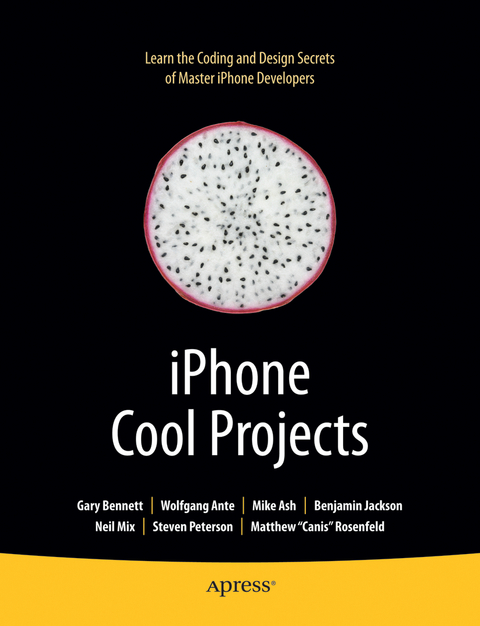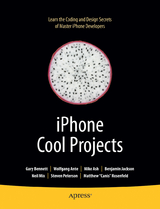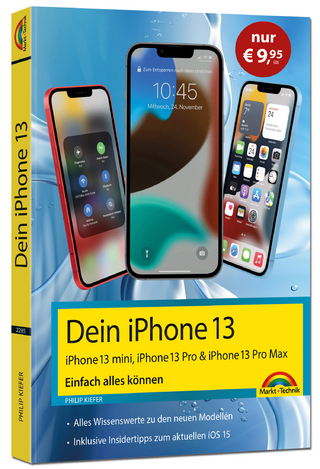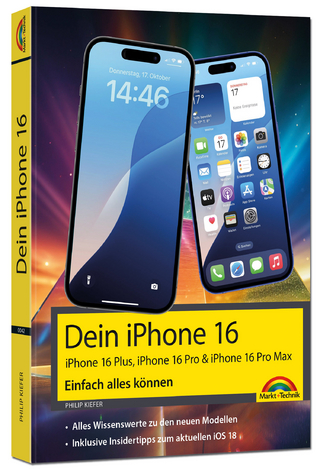iPhone Cool Projects
Seiten
2009
|
1st ed.
Apress (Verlag)
978-1-4302-2357-3 (ISBN)
Apress (Verlag)
978-1-4302-2357-3 (ISBN)
No matter what type of application you are writing, you will find something in this book to help you make your app that little bit cooler.The book opens with Wolfgang Ante, the developer behind the Frenzic puzzle game, showing how timers, animation, and intelligence are used to make game play engaging.
The iPhone and iPod touch have provided all software developers with a level playing field—developers working alone have the same access to consumers as multinational software publishers. Very cool indeed! To make your application stand out from the crowd, though, it has to have that something extra. You must learn the skills to take your apps from being App Store filler to download chart-topping blockbusters.
Developers with years of experience helped write this book. Spend some time understanding their code and why they took the approach they did. You will find the writing, illustrations, code, and sample applications second to none. No matter what type of application you are writing, you will find something in this book to help you make your app that little bit cooler.
The book opens with Wolfgang Ante, the developer behind the Frenzic puzzle game, showing how timers, animation, and intelligence are used to make game play engaging. It moves on to Rogue Amoeba's Mike Ash explaining how to design a network protocol using UDP, and demonstrating its use in a peer-to-peer application—a topic not normally for the faint of heart, but explained here in a way that makes sense to mere mortals. Gary Bennett then covers the important task of multithreading. Multithreading can be used to keep the user interface responsive while working on other tasks in the background. Gary demonstrates how to do this and highlights traps to avoid along the way.
Next up, Canis Lupus (aka Matthew Rosenfeld) describes the development of the Keynote-controlling application Stage Hand, how the user interface has evolved, and the lessons he has learned from that experience. Benjamin Jackson then introduces two open source libraries: cocos2d, for 2D gaming; and Chipmunk, for rigid body physics (think “collisions”). He describes the development of ArcadeHockey, an air hockey game, and explains some of the code used for this.
Neil Mix of Pandora Radio reveals the science behind processing streaming audio. How do you debug what you can't see? Neil guides you through the toughest challenges, sharing his experience of what works and what to watch out for when working with audio. Finally, Steven Peterson demonstrates a comprehensive integration of iPhone technologies. He weaves Core Location, networking, XML, XPath, and SQLite into a solid and very useful application.
Software development can be hard work. Introductory books lay the foundation, but it can be challenging to understand where to go next. This book shows some of the pieces that can be brought together to make complete, cool applications.
The iPhone and iPod touch have provided all software developers with a level playing field—developers working alone have the same access to consumers as multinational software publishers. Very cool indeed! To make your application stand out from the crowd, though, it has to have that something extra. You must learn the skills to take your apps from being App Store filler to download chart-topping blockbusters.
Developers with years of experience helped write this book. Spend some time understanding their code and why they took the approach they did. You will find the writing, illustrations, code, and sample applications second to none. No matter what type of application you are writing, you will find something in this book to help you make your app that little bit cooler.
The book opens with Wolfgang Ante, the developer behind the Frenzic puzzle game, showing how timers, animation, and intelligence are used to make game play engaging. It moves on to Rogue Amoeba's Mike Ash explaining how to design a network protocol using UDP, and demonstrating its use in a peer-to-peer application—a topic not normally for the faint of heart, but explained here in a way that makes sense to mere mortals. Gary Bennett then covers the important task of multithreading. Multithreading can be used to keep the user interface responsive while working on other tasks in the background. Gary demonstrates how to do this and highlights traps to avoid along the way.
Next up, Canis Lupus (aka Matthew Rosenfeld) describes the development of the Keynote-controlling application Stage Hand, how the user interface has evolved, and the lessons he has learned from that experience. Benjamin Jackson then introduces two open source libraries: cocos2d, for 2D gaming; and Chipmunk, for rigid body physics (think “collisions”). He describes the development of ArcadeHockey, an air hockey game, and explains some of the code used for this.
Neil Mix of Pandora Radio reveals the science behind processing streaming audio. How do you debug what you can't see? Neil guides you through the toughest challenges, sharing his experience of what works and what to watch out for when working with audio. Finally, Steven Peterson demonstrates a comprehensive integration of iPhone technologies. He weaves Core Location, networking, XML, XPath, and SQLite into a solid and very useful application.
Software development can be hard work. Introductory books lay the foundation, but it can be challenging to understand where to go next. This book shows some of the pieces that can be brought together to make complete, cool applications.
Ten authors; ten successful iPhone developers; each with a unique story.
Designing a Simple, Frenzic-Style Puzzle Game.- Mike Ash’s Deep Dive Into Peer-to-Peer Networking.- Doing Several Things at Once: Performance Enhancements with Threading.- All Fingers and Thumbs: Multitouch Interface Design and Implementation.- Physics, Sprites, and Animation with the cocos2d-iPhone Framework.- Serious Streaming Audio the Pandora Radio Way.- Going the Routesy Way with Core Location, XML, and SQLite.
| Zusatzinfo | XIX, 240 p. |
|---|---|
| Verlagsort | Berlin |
| Sprache | englisch |
| Maße | 178 x 232 mm |
| Themenwelt | Informatik ► Betriebssysteme / Server ► iOS |
| Informatik ► Betriebssysteme / Server ► Macintosh / Mac OS X | |
| Informatik ► Programmiersprachen / -werkzeuge ► Mac / Cocoa Programmierung | |
| Informatik ► Weitere Themen ► Hardware | |
| Informatik ► Weitere Themen ► Smartphones / Tablets | |
| Schlagworte | iPhone |
| ISBN-10 | 1-4302-2357-X / 143022357X |
| ISBN-13 | 978-1-4302-2357-3 / 9781430223573 |
| Zustand | Neuware |
| Informationen gemäß Produktsicherheitsverordnung (GPSR) | |
| Haben Sie eine Frage zum Produkt? |
Mehr entdecken
aus dem Bereich
aus dem Bereich
13 Pro, 13 Pro Max, 13 mini
Buch | Softcover (2024)
Markt + Technik (Verlag)
CHF 13,90
iPhone Plus 16, Pro 16 & 16 Pro Max : Einfach alles können
Buch | Softcover (2024)
Markt + Technik (Verlag)
CHF 27,90




